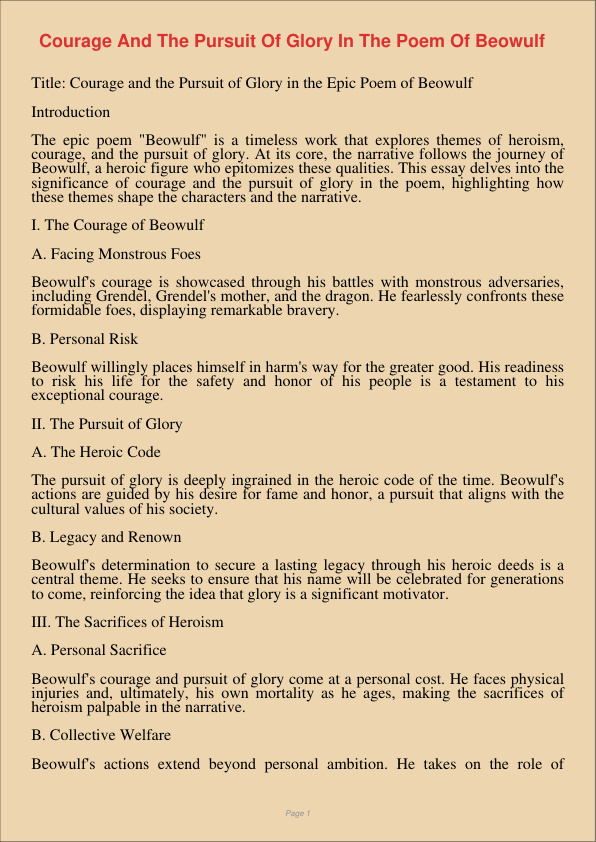
Title: Courage and the Pursuit of Glory in the Epic Poem of Beowulf
Introduction
The epic poem “Beowulf” is a timeless work that explores themes of heroism, courage, and the pursuit of glory. At its core, the narrative follows the journey of Beowulf, a heroic figure who epitomizes these qualities. This essay delves into the significance of courage and the pursuit of glory in the poem, highlighting how these themes shape the characters and the narrative.
I. The Courage of Beowulf
A. Facing Monstrous Foes
Beowulf’s courage is showcased through his battles with monstrous adversaries, including Grendel, Grendel’s mother, and the dragon. He fearlessly confronts these formidable foes, displaying remarkable bravery.
B. Personal Risk
Beowulf willingly places himself in harm’s way for the greater good. His readiness to risk his life for the safety and honor of his people is a testament to his exceptional courage.
II. The Pursuit of Glory
A. The Heroic Code
The pursuit of glory is deeply ingrained in the heroic code of the time. Beowulf’s actions are guided by his desire for fame and honor, a pursuit that aligns with the cultural values of his society.
B. Legacy and Renown
Beowulf’s determination to secure a lasting legacy through his heroic deeds is a central theme. He seeks to ensure that his name will be celebrated for generations to come, reinforcing the idea that glory is a significant motivator.
III. The Sacrifices of Heroism
A. Personal Sacrifice
Beowulf’s courage and pursuit of glory come at a personal cost. He faces physical injuries and, ultimately, his own mortality as he ages, making the sacrifices of heroism palpable in the narrative.
B. Collective Welfare
Beowulf’s actions extend beyond personal ambition. He takes on the role of protector for his people, and his pursuit of glory is intertwined with the welfare of his community.
IV. Thematic Complexity
A. Conflicts of Heroism
The poem explores the complexities of heroism, as it is not always clear-cut. Beowulf’s pursuit of glory may lead to conflicts, such as when his youthful bravery and desire for recognition clash with the responsibilities of ruling as a wise king.
B. The Role of Fate
The poem suggests that fate plays a significant role in the hero’s pursuit of glory. Beowulf’s destiny is intertwined with his courageous actions, and his ultimate fate underscores the transient nature of human glory.
Conclusion
“Beowulf” stands as a classic epic that delves into the themes of courage and the pursuit of glory, highlighting the complexities of heroism. Beowulf’s unwavering courage, pursuit of renown, and the sacrifices he makes for the greater good provide a timeless example of heroism. The poem prompts readers to consider the multifaceted nature of heroism, the relationship between individual ambition and collective welfare, and the role of fate in shaping the pursuit of glory. “Beowulf” remains a source of inspiration and reflection on the enduring qualities of courage and the desire for immortal fame.
「真诚赞赏,手留余香」
真诚赞赏,手留余香
使用微信扫描二维码完成支付
